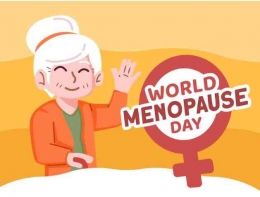World Menopause Day is held every year on the 18th October. Menopause is a natural period of change in which a woman's reproductive ability stops. World Health Organization (WHO) defines menopause as the "permanent termination of menstruation as a result of the loss of ovarian activity". It is associated with the decrease in estrogen secretion that occurs physiologically due to loss of follicular functions. The age of the natural menopause among women in developed countries is between 50 and 52 years whereas, in the less developed countries, it is 3 -4 years less.
Menopause symptoms affect all aspects of life quality. Some symptoms of menopause include hot flashes and night sweats, sleep disruption, and low energy levels, as well as psychological symptoms such as anxiety, difficulty in concentrating, overreacting to minor upsets, forgetfulness, and quickly being irritated, and mood swings.
After menopause, the risk of certain medical conditions increases due to changes in the body's hormone levels. Some examples of this include obesity, metabolic syndrome and diabetes, cardiovascular disease (CVD), osteoporosis and osteoarthritis, cognitive decline, dementia and depression, and cancer. Cardiovascular disease is the most common cause of death in women, accounting for the greatest proportion of deaths over the age of 50 years.
Prevention strategies at menopause have to begin with screening and careful assessment for risk factors. For example screening for cardiovascular disease includes measurement of blood pressure, lipids and perhaps inflammatory markers, and BMI. Screening for cancer, for the example cervical cancer by implementation of screening through Pap smears or possibly HPV detection. Breast cancer, screening is recommended by performing mammography between 50 - 74 years old, and for colon cancer, Fecal occult blood testing (FOBT) is the most widely used screening test. Evidence-based prevention for the diseases noted above include lifestyle management, cessation of smoking, curtailing excessive alcohol consumption, a healthy diet and moderate exercise, as well as mentally stimulating activities.
Below are some lifestyle changes proven to help your menopause and postmeopause years.
- Physical activity: A combination of these three types of regular exercise is recommended. Weight bearing exercise: Such as brisk walking, running, Aerobic exercise: Which raises the heart rate is good for heart health and circulation, Stretching: Such as yoga, maintains flexibility and joint movement. Aim for 30 minutes per day of something you enjoy.
- Healthy diet, for example, daily salt consumption less than 300 mg (according to British Hypertension Society guidelines), consumption of 1 g calcium per day, providing 800 IU vitamin D intake, reduction of carbohydrate and fat consumption, reduction of sugary foods-junk food, and increase in consumption of fruits, vegetables and seafood
- Drink: Filtered water, to ensure good hydration and maintain body temperature, soya milk, a good source of omega 3 fatty acids, protein, vitamins and minerals. Limited Stimulants drinks such as alcohol, coffee, tea - which can hinder the absorption of nutrients and produce heat in the body.
- Quit smoking and alcohols: it's a big risk factor in osteoporosis and smoking doubles your odds of developing heart diseases.
- Maintain a healthy body weight: Lowering body mass index (BMI) below 25 kg/m2
- Vitamin and minerals: It is important to consult your health professional or nutritionalist, especially if you are taking prescribed medication.
- Keep a positive attitude
- Get emotional support - chat to family & friends
Baca konten-konten menarik Kompasiana langsung dari smartphone kamu. Follow channel WhatsApp Kompasiana sekarang di sini: https://whatsapp.com/channel/0029VaYjYaL4Spk7WflFYJ2H







